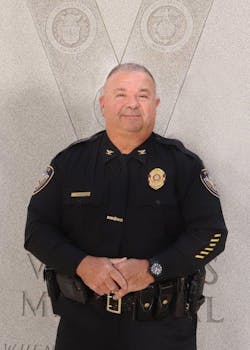Siler City, North Carolina, Police Chief Mike Wagner is retiring after serving in law enforcement for more than 30 years. The police force he leads has 23 sworn officers and serves a population of around 10,000. He spoke to OFFICER Magazine about the challenges smaller agencies face when it comes to budgets and management. This interview has been edited for clarity and length.
This article appeared in the March/April issue of OFFICER Magazine. Click Here to subscribe to OFFICER Magazine.
What challenges exist in your area?
Our city is located about 30 minutes west of Greensboro and about 40 minutes east of Raleigh. We have small-town policing, but major city crime. So, it’s a unique blend. We just landed the biggest mega site the state has ever seen. The anticipated growth could likely double our department in the next 3-5 years. In my last year as chief, I’ve tried to have a vision, so my successor can have a plan in place.
What are your main budget concerns?
The biggest struggle is staffing and training. Without adequate staffing, you can’t meet your training needs. When I first came here we were reliant on outside agencies for training. My first area of focus was to establish a cadre of instructors in our high-risk, high-liability firearms and defensive tactics areas. A lot of it’s done on the job during their time at work instead of their days off. We also struggle with being a small town trying to attract quality officers with the training and professionalism this job requires. As a small-town chief, the dynamics of policing for me are no different than a big-town chief, I just don’t have the resources available to sustain the dynamics of it.
Have local lawmakers been helpful?
I think to some degree. When I look at particular grants and I’ve talked to my federal and state representatives, a lot of these grants ask for particular requirements. You must serve a population of 25,000 or 50,000. My jurisdiction does not serve that population. I ask, do the citizens of Siler City not deserve the same level of crime prevention and criminal apprehension the big cities do? The smaller jurisdictions like mine often don’t even get a seat at the table.
What challenges does operating a smaller law enforcement agency pose?
I’ve been a big proponent that you can make a career here in Siler City. Over the past few years, we have had some very successful recruiting events. We’ve been able to offer a $5,000 sign-on bonus and have been able to pay our staff to recruit. The town manager also has become very committed to a compensation study annually to ensure that we are at fair market or a little bit above fair market value. What our elected officials are struggling with is that the revenue doesn’t match up to the big cities and the public safety budget every year since I’ve been here has increased. This year, based on the potential growth, my budget increased by 66%—at least the requested part of it—in order to build for the next three to five years. These things have to be in place, and they are big ticket items that just can’t all be put into one year.
What advice would you give to other agencies?
You have to remain committed, but you must also have a framework to be good stewards. Educate the public on why you need particular funds and don’t be scared to share the cost. When I asked our citizens, “How much do you think it costs for me to hire a new officer?,” the answer I got was $40-$50 thousand. When you include a new car, cameras, weapon systems, training and everything an officer needs, it costs about $142,000. They’re like, “Oh my gosh, we had no idea.” That’s a sticker shock they don’t understand.
Listen to the full interview at officer.com/53099543
About the Author
Paul Peluso
Editor
Paul Peluso is the Managing Editor of OFFICER Magazine and has been with the Officer Media Group since 2006. He began as an Associate Editor, writing and editing content for Officer.com. Previously, Paul worked as a reporter for several newspapers in the suburbs of Baltimore, MD.


